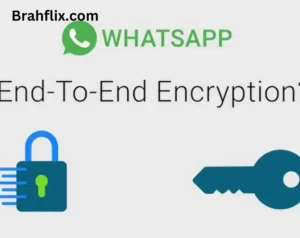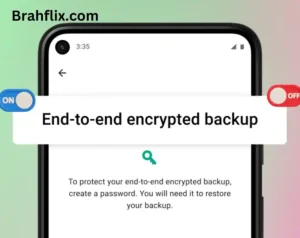Introduction
In today’s digital landscape, safeguarding your personal information has never been more crucial. One of the ways to ensure your communications are private is by enabling end-to-end encryption in messaging apps like WhatsApp. But how to enable end-to-end encryption in WhatsApp and why is it so important? This comprehensive guide will walk you through the process, explain the significance of encryption, and address common concerns related to privacy and security.
Key Takeaways:
- End-to-end encryption ensures that only you and your intended recipient can read your messages.
- Enabling encryption in WhatsApp is straightforward and built into the app by default.
- Understanding encryption helps you make informed decisions about your digital privacy.
- Regular updates and security practices enhance the effectiveness of encryption.
1. What is End-to-End Encryption?
End-to-end encryption (E2EE) is a method of data transmission where only the communicating users can read the messages. In other words, the encryption ensures that your messages are only decipherable by the sender and recipient, and not by anyone else, including the service provider.
Key Aspects of End-to-End Encryption:
- Message Protection: Data is encrypted before it leaves your device and only decrypted by the recipient’s device.
- Security Keys: Both the sender and recipient use cryptographic keys to encode and decode messages.
- Invisibility to Third Parties: Even the messaging service provider cannot access the content of the messages.
End-to-end encryption is crucial for protecting sensitive information and maintaining privacy in a world where data breaches and unauthorized access are prevalent.
2. Why Is End-to-End Encryption Important?
Understanding the importance of end-to-end encryption helps underscore why you should enable it.
Significance of End-to-End Encryption:
- Privacy Assurance: It provides a high level of privacy by ensuring that only the intended recipient can read the messages.
- Protection Against Unauthorized Access: Guards against potential interception by hackers, governments, or third parties.
- Data Integrity: Ensures that the content of your communications is not tampered with during transmission.
In a time when privacy concerns are at an all-time high, knowing that your messages are protected by end-to-end encryption adds a layer of security that is both reassuring and necessary.
3. How Does WhatsApp Implement End-to-End Encryption?
WhatsApp employs end-to-end encryption by default, which means you don’t need to manually enable it for standard chats. However, understanding how it works within the app can provide clarity on how your messages are protected.
How WhatsApp Encryption Works:
- Default Encryption: Every message, call, photo, and video sent via WhatsApp is encrypted automatically.
- Encryption Protocol: Uses the Signal Protocol for secure messaging.
- Key Management: Encryption keys are stored only on the user’s device, not on WhatsApp servers.
WhatsApp’s implementation of encryption is designed to be seamless and automatic, ensuring that all communications are secure without additional steps from the user.
4. How to Enable End-to-End Encryption in WhatsApp
While WhatsApp messages are encrypted in transit, backup data is stored separately and might not be encrypted by default. To enhance security, WhatsApp allows users to enable encryption for their chat backups.
Steps to Enable Encryption for Backups:
- Open WhatsApp: Launch the app on your device.
- Go to Settings: Tap on the three dots in the upper right corner (Android) or the settings icon (iOS).
- Select Chats: Navigate to the “Chats” section.
- Chat Backup: Tap on “Chat Backup.”
- Enable Encryption: Toggle on the option for “Encrypt Backup.”
Encrypted backups ensure that even if your backup data is accessed, it remains secure and protected from unauthorized access.
5. Managing Security Settings in WhatsApp
Apart from encryption, WhatsApp provides several other security features that help protect your privacy.
Key Security Settings:
- Two-Step Verification: Adds an extra layer of security by requiring a PIN when registering your phone number.
- Security Notifications: Alerts you when a contact’s security code changes.
- Privacy Settings: Allows you to control who can see your last seen, profile photo, and status.
Regularly reviewing and updating these settings can further enhance your overall security and privacy on WhatsApp.
6. Common Misconceptions About WhatsApp Encryption
There are several misconceptions about WhatsApp’s encryption that can lead to confusion. Understanding these myths can help clarify how secure your communications truly are.
Debunking Common Myths:
- Myth: WhatsApp can access your messages.
- Fact: WhatsApp cannot access your messages due to end-to-end encryption.
- Myth: Encryption can be easily bypassed.
- Fact: End-to-end encryption is highly secure and not easily bypassed by third parties.
- Myth: All backups are encrypted.
- Fact: Backup encryption must be enabled separately and is not automatically applied.
Clarifying these misconceptions helps in better understanding the robust security measures WhatsApp employs.
7. Comparing WhatsApp Encryption with Other Messaging Apps
Comparing WhatsApp’s encryption with other messaging apps provides insight into how different platforms handle security.
Comparison with Other Apps:
- Signal: Known for its strong privacy features and end-to-end encryption for all communications.
- Telegram: Offers optional end-to-end encryption in “Secret Chats,” but not for regular chats.
- iMessage: Uses end-to-end encryption, but is limited to Apple devices.
Each app has its own approach to encryption, and understanding these differences can help you choose the best platform for your needs.
8. Potential Vulnerabilities and Best Practices
While end-to-end encryption provides robust security, no system is completely foolproof. Knowing potential vulnerabilities and best practices can further safeguard your communications.
Potential Vulnerabilities:
- Phishing Attacks: Fraudulent messages can trick users into revealing sensitive information.
- Device Security: If your device is compromised, so is your WhatsApp data.
- Social Engineering: Attackers may use manipulation to gain access to your accounts.
Best Practices:
- Enable Two-Step Verification: Adds an additional layer of security.
- Update Regularly: Keep your app updated to benefit from the latest security patches.
- Be Cautious of Links and Attachments: Avoid clicking on suspicious links or opening unknown attachments.
Adhering to these best practices helps maintain the integrity of your encrypted communications.
9. Understanding WhatsApp’s Role in Privacy Regulations
WhatsApp’s encryption practices are influenced by global privacy regulations and standards. Understanding how these regulations impact the app’s security features can provide additional context.
Relevant Privacy Regulations:
- General Data Protection Regulation (GDPR): European regulation that impacts data privacy and user rights.
- California Consumer Privacy Act (CCPA): U.S. regulation providing privacy rights to California residents.
- Health Insurance Portability and Accountability Act (HIPAA): U.S. regulation affecting health-related data.
Compliance with these regulations ensures that WhatsApp adheres to high standards of privacy and data protection.
FAQs
Is end-to-end encryption enabled by default on WhatsApp?
Yes, WhatsApp automatically encrypts all messages, calls, photos, and videos by default.
How can I ensure my chat backups are encrypted?
Go to WhatsApp settings, navigate to “Chats,” and enable encryption for backups under “Chat Backup.”
Can WhatsApp access my encrypted messages?
No, WhatsApp cannot access your encrypted messages due to its end-to-end encryption.
What should I do if I suspect my WhatsApp account has been compromised?
Immediately change your account password, enable two-step verification, and review your account security settings.
How does WhatsApp encryption compare to other messaging apps?
WhatsApp uses strong end-to-end encryption similar to Signal but differs from apps like Telegram, which only offers encryption in secret chats.
Conclusion
Understanding how to enable end-to-end encryption in WhatsApp is essential for maintaining your privacy and security. With encryption being automatically enabled for all communications and the option to encrypt backups, WhatsApp provides robust protection for your messages.
By following the best practices and staying informed about potential vulnerabilities, you can further enhance your security. How do you ensure your communications are secure? Share your thoughts and experiences in the comments below. For more insights into digital privacy and security, explore our other blogs and stay informed!